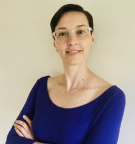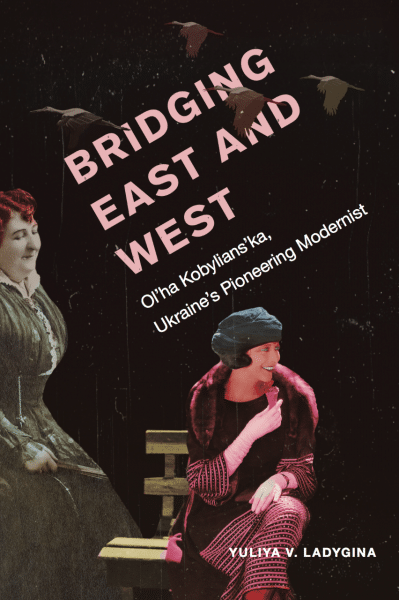
Yuliya V. Ladygina
Helena Rubinstein University Endowed Fellow in the Humanities and Assistant Professor of Russian and Global Studies, Pennsylvania State University, University Park.

My new book project, tentatively titled The Reel Story of the Euromaidan and Russia’s War on Ukraine, examines the legacy of Soviet and Hollywood war films, as well as the influence of contemporary media practices in (mis)representing war, terror, and terrorism in cinematic depictions of Russia’s ongoing war on Ukraine. By analyzing portrayals of the 2013-2014 Euromaidan Revolution, the 2014 annexation of Crimea, the Donbas War, and Russia’s 2022 full-scale invasion of Ukraine in recent Ukrainian films, I set out to shed light on the myths and ideological touchstones that contemporary Ukrainian filmmakers inherited from their 20th century predecessors and elaborate on how canonical narratives and images from the past have been transformed and adjusted to the new historical circumstances. In my study, I pay close attention to how post-Soviet, postcolonial, and post-truth aspects of war-torn Ukraine conflate within the works of contemporary Ukrainian filmmakers to offer fresh perspectives on issues of memory and national identity. I am also interested in how Ukrainian filmmakers address the subject of control and circulation of information for political ends and how they frame cinema and other forms of media as pivotal strategic territories, where some of the key battles of contemporary wars are taking place, affecting how these wars are perceived, and what actions are taken by those directly involved in them. Although the primary object of my investigation is Ukraine-centric, its implications promise to reach beyond the field of Ukrainian studies and as widely as the topics of the films it analyzes—from heterarchical identities and new modes of political mobilizations to weaponization of history, the instrumentalization of culture, and digital warfare. Regrettably, my fieldwork and archival research plans for the project were first postponed because of COVID-19 and are now suspended indefinitely because of the war. Therefore, I had to adapt and reorganize my project based on available materials. Some of my preliminary findings have appeared or are about to appear in East/West: Journal of Ukrainian Studies and East European Jewish Affairs. Recently, I also coedited a special “Focus on Ukraine” forum in the latest issue of KinoKultura (July 2022)—a venture directly related to my research on contemporary Ukrainian cinema—which features several high-profile interviews and almost forty reviews of recent Ukrainian films. The forum is a rich and timely resource for those looking to diversify their syllabi by including manageable and easily accessible Ukraine-related content.
Before accepting a tenure-track position at The Pennsylvania State University in 2019, I was a Research Fellow at the Harvard Ukrainian Research Institute (2014), a Visiting Assistant Professor of Russian at Williams College (2013-2015), and a Visiting Assistant Professor of Russian and Humanities at The University of the South, Sewanee (2015-2019), where I taught courses on Russian and comparative literature, film, rhetorical writing, Russian language, and 19th- and 20th-century European and Russian intellectual history. At Sewanee, I also served as the Sewanee Summer in Russia Program director. I am infinitely grateful to Julie Cassiday, Janneke van de Stadt, and Elizabeth Skomp for welcoming me into the profession and coaching me through my first years of teaching. I am equally grateful for the continuous support and guidance of my senior colleagues at The Pennsylvania State University, as well as the many colleagues in the field of Ukrainian Studies, especially those affiliated with the Harvard Ukrainian Research Institute, who help me grow as an academic and a scholar.
Russia’s unprovoked full-scale invasion of Ukraine, launched on 24 February 2022, took a horrific toll on my homeland and my people, disrupting our livelihoods and forcing us to take on new roles. While I have been out of any immediate physical danger in central Pennsylvania, the war came all too close to my home. Russian troops were literally a mere five miles away from my native village north of Kyiv. Many of my family members and close friends have been caught in its midst—some are fighting at the front, some are working around the clock to provide our defenders with bare necessities, some are trapped in makeshift shelters under ceaseless bombardments, and some are scattered across Europe as refugees. A 3 a.m. phone call from a childhood friend somewhere in Poland with “I can’t understand any of this paperwork; it’s either in Polish or in English. Can you read it for me?”; or from a niece stuck in her cellar with “My six-year-old won’t stop crying. I can’t take it anymore. What do I do?”; or from a high school sweetheart now fighting at the front with “Yul’, we’ve been hit hard; lots of blood everywhere. Do you know anyone, who can get us tourniquets and some basic medical supplies fast?” are my new normal. In late February 2022, I became—almost overnight—the primary provider of emotional support for my loved ones back in Ukraine and my students at The Pennsylvania State University, many of whom are of Ukrainian descent and are directly affected by the war. To manage the devastating stress and help my students deal with the war-related angst, I learned to organize rallies and public events, run fundraising and awareness campaigns, and represent and advocate for Ukraine in every conversation and on every possible platform. Almost overnight, I also found myself being one of the lead local experts on Ukraine and had to learn on the fly how to talk about the war, its history, its toll, and its global ramifications with drama-hungry journalists and eager, yet little-informed, audiences. With time, I also learned how to talk to colleagues across disciplines about the logistics, purpose, and value of addressing Russia’s war on Ukraine in our classrooms and how, by doing so, to promote and improve the work that we do as individuals, departments, and as a profession dedicated to critical and creative humanities in North American higher education. At a time when there is no longer any distinction between the survival of Ukraine and its people and the survival of its history and ideas and when Ukrainian culture has become a crucial line of defense for democracy and the whole liberal order, I, as most of my colleagues back in Ukraine and beyond, have embraced our role of conduits of vital historical and social information and welcome invitations to lecture on Ukraine-related inquiries. Let’s keep Ukraine in the spotlight—the fight is far from over!
There are two sets of ways in which Western academic institutions and the ASEEES community can support Ukrainian scholars affected by the war: those addressing urgent, short-term support and those tailored with long-term ramifications in mind. To facilitate immediate relief, there is a need to provide scholars at risk with short-term opportunities to do research at your institutions, to offer non-residential fellowships for those who cannot leave Ukraine or must remain in its vicinity for personal reasons, to invite Ukrainian experts and public figures as guest lecturers for in-person and virtual events, to fund research in and publications of all-things Ukrainian, to grant scholarships for Ukrainian students, and to help Ukrainian research and cultural heritage institutions to save and preserve their data and artifacts. To promote long-term support, Western academic institutions and scholars affiliated with ASEEES ought to invest in the development of Ukrainian Studies—course offerings, faculty lines, support for graduate research, partnerships with Ukrainian academic institutions—and commit to decolonizing Russian Studies and the SEEES field at large. By decolonizing, I mean challenging existing institutional structures that allow Russian Studies to dominate Slavic and Eastern European Studies programs, destabilizing the canon, and rethinking epistemology. It is time we recognize Eastern Europe and Eurasia for what it is—a region composed of a wide range of identities and cultures, each a vibrant skein and worth studying in its own right. It is also high time we acknowledge and interrogate Russia’s history of colonialism and revise our syllabi and approaches to critical inquiry accordingly. I believe it would be highly productive to organize a series of practical workshops at the upcoming ASEEES conferences to discuss new approaches to teaching Russia’s intellectual history, its literary classics, and the key events in Russian, European, and world history in the context of Russia’s ongoing genocidal war against everything Ukrainian and its pervasive weaponization of information in the process.
While I am confident that professional ethics and common sense will compel the ASEEES community to carry out the long-overdue revision and restructuring of our field, I am less optimistic about the long-term ramifications of the ongoing war on the academic landscape in Ukraine. Certainly, the unprecedented visibility of Ukrainian and Ukraine-related scholarship in the West, as well as multiple residency opportunities at Western academic institutions offered to Ukrainian scholars and students through scholar-at-risk programs, will stimulate new research, establish foundations for future collaborations, and provide invaluable experience needed to rebuild and reform Ukrainian academia after the war. Yet, it would be naïve, if not fatal, to underestimate the long-term consequences of the utter disruption of all academic activities, including elementary and secondary education, and the capital destruction of research and educational infrastructure in Ukraine. According to Ukraine’s Education Ministry, over 7 million children lost access to education, and over 2,100 educational institutions have been damaged or destroyed since Russia’s February invasion. The most notable are the Skovoroda National Pedagogical University in Kharkiv and two universities in Mykolaiv, the National Shipbuilding University and the V.O. Sukhomlynskyi Mykolaiv National University. Rebuilding schools and universities and restoring their equipment, labs, libraries, and archives would require significant resources. Returning to academic business-as-usual would also be challenging. Those students and teachers who survive and return to Ukraine will experience stress and trauma that will make learning and teaching difficult, if not impossible, in some cases. Ukraine will need considerable help to recover and revitalize its academic life, and it is to a great degree on us, Western academics and SEEES experts, to shape public discourse and raise the new generation of analysts, policymakers, and informed voters who will assure that help. So, let us do what we do best—educate, inspire intellectual curiosity, foster critical thinking, and advocate for the right cause. Let us also continue calling our representatives and demand more arms for Ukraine—before any practical talk about rebuilding the academic landscape in Ukraine can take place, the ruthless slaughter must be stopped.
Slava Ukraini!